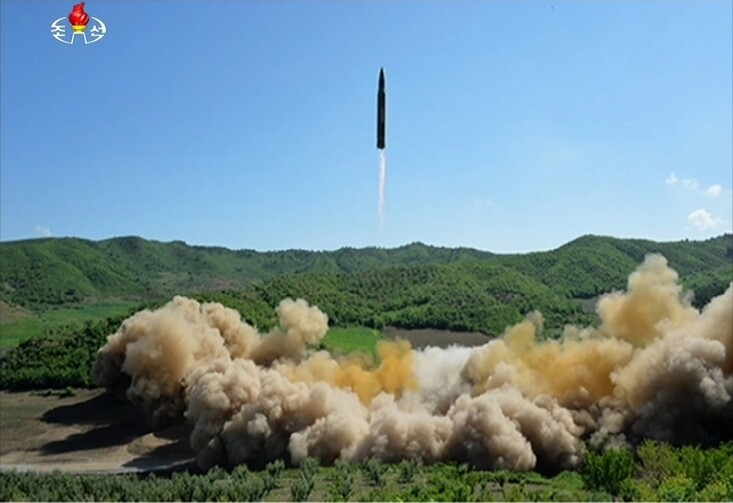hankyoreh
Links to other country sites 다른 나라 사이트 링크
[Editorial] North Korea’s ICBM launch throws cold water on initiative to restart dialogue

North Korea has claimed that the missile it test-launched on July 4 was an intercontinental ballistic missile (ICBM). Its Academy of Defense Science gave the latest intercontinental ballistic rocket Hwasong-14’s maximum altitude as 2,802 km and its flight distance as 933 km. The US Pacific Command said it had determined the missile to be an intermediate-range ballistic missile (IRBM) that poses no threat to the mainland US. That determination does not appear to be too far off, as an ICBM has a firing range of roughly 5,500 km or more. But with North Korea confirming once again its continued development of missiles to target the mainland US, the response from Washington appears certain to raise tensions.
North Korea may ask why other countries have the right to interfere in a sovereign state’s missile development, but the international community can hardly stand by and watch when the North’s objectives are so obvious. President Moon Jae-in has been trying to maintain a forward-looking stance on North Korea by urging US President Donald Trump to pursue dialogue alongside pressure. But North Korea’s missile launch dashes cold water on such efforts. It’s really unfortunate. It‘s as if North Korea doesn’t know, or care, what’s going on in the world outside.
Soon after the missile launch, Trump got on Twitter to call for stronger sanctions against North Korea: “Hard to believe that South Korea and Japan will put up with this much longer. Perhaps China will put a heavy move on North Korea and end this nonsense once and for all!” During a meeting of the National Security Council on the same day, Moon called for the UN Security Council to take action and for the international community to make a firm response. These circumstances make it gradually more difficult even for the Moon administration to persuade the international community of the need for dialogue with North Korea. This could even undermine the principle of South Korea taking the initiative on Korean Peninsula issues, which was upheld during the recent summit.
It’s not too late for North Korea to dispense with the wrongheaded notion that its nuclear weapons and missiles are protecting it and to make the bold decision to denuclearize. Furthermore, Moon must not let North Korea’s missile launch undermine his current stance on the North Korean issue, including his policy of “dialogue alongside pressure,” which he has been planning to promote during his visit to Germany and the G-20 summit in Hamburg. Sometimes, we need the wisdom to patiently seek a breakthrough, and that’s the fate of the Moon administration’s North Korean policy. We also hope that Moon will keep working on setting up a unified inter-Korean team for next year’s Pyeongchang Winter Olympics regardless of this missile launch, according to the principle of keeping private-sector exchange with North Korea separate from the political and military situation.
Please direct questions or comments to [english@hani.co.kr]

Editorial・opinion
![[Column] The state is back — but is it in business? [Column] The state is back — but is it in business?](https://flexible.img.hani.co.kr/flexible/normal/500/300/imgdb/original/2024/0506/8217149564092725.jpg) [Column] The state is back — but is it in business?
[Column] The state is back — but is it in business?![[Column] Life on our Trisolaris [Column] Life on our Trisolaris](https://flexible.img.hani.co.kr/flexible/normal/500/300/imgdb/original/2024/0505/4817148682278544.jpg) [Column] Life on our Trisolaris
[Column] Life on our Trisolaris- [Editorial] Penalties for airing allegations against Korea’s first lady endanger free press
- [Editorial] Yoon must halt procurement of SM-3 interceptor missiles
- [Guest essay] Maybe Korea’s rapid population decline is an opportunity, not a crisis
- [Column] Can Yoon steer diplomacy with Russia, China back on track?
- [Column] Season 2 of special prosecutor probe may be coming to Korea soon
- [Column] Park Geun-hye déjà vu in Yoon Suk-yeol
- [Editorial] New weight of N. Korea’s nuclear threats makes dialogue all the more urgent
- [Guest essay] The real reason Korea’s new right wants to dub Rhee a founding father
Most viewed articles
- 1[Column] Why Korea’s hard right is fated to lose
- 2Amid US-China clash, Korea must remember its failures in the 19th century, advises scholar
- 3[Column] The state is back — but is it in business?
- 460% of young Koreans see no need to have kids after marriage
- 5Trump’s talk of flouting NATO promises sparks apprehension in Seoul
- 6[Column] Can Yoon steer diplomacy with Russia, China back on track?
- 7[Guest essay] Maybe Korea’s rapid population decline is an opportunity, not a crisis
- 8South Korea officially an aged society just 17 years after becoming aging society
- 9[Guest essay] The real reason Korea’s new right wants to dub Rhee a founding father
- 10AI is catching up with humans at a ‘shocking’ rate